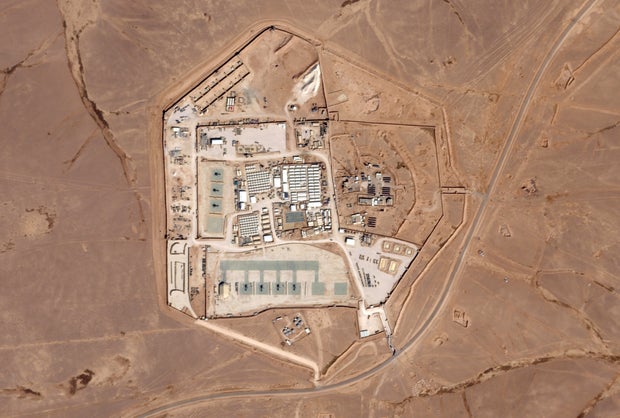U.S. officials have confirmed to CBS News that plans have been approved for a series of strikes over a number of days against targets — including Iranian personnel and facilities — inside Iraq and Syria. The strikes will come in response to drone and rocket attacks targeting U.S. forces in the region, including the drone attack on Sunday that killed three U.S. service members at the Tower 22 base inside Jordan, near the Syrian border.
Speaking at the Pentagon Thursday, Defense Secretary Lloyd Austin told reporters that the U.S. won’t tolerate attacks on American troops.
“This is a dangerous moment in the Middle East,” Austin said, noting that Israel’s ongoing war against Hamas in the Gaza Strip and attacks by Houthi rebels in Yemen on commercial shipping in the Red Sea were also happening in the region. “We will continue to work to avoid a wider conflict in the region, but we will take all necessary actions to defend the United States, our interests and our people, and we will respond when we choose, where we choose and how we choose.”
Weather will be a major factor in the timing of the strikes, the U.S. officials told CBS News, as the U.S. has the capability to carry out strikes in bad weather but prefers to have better visibility of selected targets as a safeguard against inadvertently hitting civilians who might stray into the area at the last moment.
There have been no new attacks on U.S. troop locations in the region since the Iran-backed militia Kataib Hezbollah announced Wednesday that it was suspending military operations against American forces. There was no indication from U.S. officials that the group’s declared suspension was delaying the American military’s retaliatory strikes.
Austin reacted to the group’s statement during Thursday’s news conference.
“We always listen to what people are saying, but we watch what they do, and … actions are everything, so we’ll see what happens in the future,” Austin said.
Iran’s reaction to the looming threat of American retaliation against what the Biden administration calls Iranian proxy groups has been a consistent denial of any responsibility for the attacks on American forces — and a warning that any strike on Iranian territory or personnel would escalate tension in the tumultuous region, not make U.S. forces safer.
Austin told reporters the U.S. was trying to “hold the right people accountable” without escalating the conflict in the region.
“We will have a multitiered response, and … we have the ability to respond a number of times depending on what the situation is,” Austin said.
A number of Iran-backed groups in the Middle East have stepped up attacks on U.S. and Israeli-linked entities amid Israel’s war with Hamas. The Palestinian militant group, which has controlled Gaza for years, sparked the war with its brutal Oct. 7 terror attack on Israel, which Israeli officials say killed some 1,200 people.
Israel has waged a devastating offensive in Gaza since that day, which officials in the Hamas-run enclave say has killed more than 26,000 people, the majority of them women and children. Israel insists that it takes all possible measures to avoid harming civilians, but has vowed to continue its offensive until Hamas is destroyed.
Iran is a vital backer of Hamas, and the many other groups it supports across the region, including the Houthi rebels in Yemen who have attacked ships in the Red Sea and Gulf of Aden, and Hezbollah in Lebanon, which has engaged in regular cross-border fire with Israeli forces, say they are attacking Western interests in support of the Palestinian people.
Early Thursday morning, U.S. forces shot down another drone over the Gulf of Aden, U.S. Central Command said in a statement posted to social media. Later in the morning, U.S. forces also destroyed a Houthi explosive sea drone in the Red Sea, the command said.
Two anti-ship ballistic missiles were launched from Houthi-controlled areas in Yemen on Thursday afternoon while a Liberian-flagged cargo ship was in the Red Sea, Central Command said. The missiles went into the water and didn’t hit the ship.


